[caption id="attachment_173555" align="alignnone" width="600"]

Photo by Mark Cornelison[/caption]
It's still a few hours before the sun rises on this blustery and blistering February morning in Lexington. An unremarkably silverish Delta ExpressJet takes a slow, viscous bath of rose-colored de-icing fluids near the Bluegrass Airport runway. And John Hampton sits inside, bleary-eyed and slumped over in the left aisle seat of Row 7, ambivalently poking and picking at his iPhone, praying that this under-heated tin can reaches Detroit with enough time to catch his connection to Cleveland.
During the course of the week, he'll be hopping planes to Knoxville, Savannah, Jacksonville and Nashville -- next week, it's Starksville, Wichita, Hattiesburg and Greenville. Hampton's been keeping this kind of brutal travel schedule for more than 20 winters -- 70-75 destinations, annually compacted into the year's most dreary months.
At every location, for forty minutes a night, he plays to vast arenas filled with tens of thousands of rowdy, color-coordinated celebrants. But he's not the gladiator they're cheering: He's the bull, the lion -- the target of yells and boos and provocations. Every night he's called blind and deaf and stupid...and several adjectives and nouns that can't be printed in this PG-rated column.
You see, John Hampton is a college basketball referee. And he loves every minute of it. Indeed, he can't wait to see his teenage son become the third generation of Hamptons to wear the black and white stripes.
===
The political wags love to judge members of my
former vocation less by the content of their character, and more by the thickness of their skin: Which politico wilts under intense scrutiny; which is tough enough to handle the taunts and tribulations of serving in the public eye?
Here's a little secret: No one likes to be criticized. While some handle bad reviews much better than others, I've spent hours in back rooms with some of the coolest of customers, and I've seen them privately rage at the slightest slight, fail to forget decades-old affronts, defer critical affairs of state to plot payback...only to let bygones be after a good night's sleep.
The worst cry-babies are often the most vociferous critics -- challenge an angry blogger or anonymous commenter, and you'll often unleash the beast of invective and countercharge and declared vengeance. Just this past week, the staid
New York Times columnist David Brooks compared the ego marginalization he suffered from nasty reader comments to America's response to ISIS...well, sort of...
read it yourself. (And hey, I've been there: For my
KSR take down of
Jefferson Davis, I took on more shrapnel than that time I piloted Brian Williams' helicopter.)
But for John Hampton -- or for any referee at the high school, college or professional level -- absorbing the rhetorical slings and arrows of home crowds is just a routine, incidental occupational hazard. Insults don't injure when you're numb to the indignity: It's like the sight of blood to a doctor; the daily heartbreak to a divorce attorney. When I reached him on his cell driving the rural highways of Bayou country, Hampton claimed that the boos "are just part of the territory... I don't take it personally. I can't take it personally. They're booing the uniform, not me...You just shut it out, like a good free throw shooter, or a pitcher with a full count."
Hampton, in fact, knows what it's like to have been on the mound, awash in the warm cheers of the arena. A Cynthiana native, he pitched and played shortstop for the legendary Harrison County High School coach Mike Whitaker, reaching the state championship game, where from his perch in the infield, he reluctantly craned his neck to watch a walk-off home run sail over the left field fence, denying his squad a banner. At the University of Kentucky, his Keith Madison-coached team came within an out of making the College World Series, his lustrous diamond career later sidetracked by a torn rotator cuff.
But unlike most young athletes who dream of a pro career with a ball in hand, Hampton's youthful ambitions were focused on wearing a whistle around his neck. His childhood hero and best friend, after all, was a ref: Doug Hampton officiated games for 30 years, and took his young son to high school gymnasiums in every corner of the Commonwealth to share the honor he earned in ensuring that the game that he loved was played fairly and honestly.
The 1970s and 80s were a golden age of Kentucky high school hoops, and John Hampton became part of that world through his travels with dad. "I'd have the run of the place when my dad was on the floor," he tells me, "I learned really important lessons about respect, and trust, and how to not let emotion take control of the game, take control of yourself."
By the time it was John's turn to wear the stripes, the profession had become even more professionalized, with strict protocols to ensure accountability, responsibility and the integrity of the game. Hampton went through a rigorous background check to secure his whistle; and every year, the NCAA and SEC require additional scrutiny and research and personal analysis. Especially since the recent NBA referee cheating scandal -- involving
accusations that playoff games were rigged for gamblers and even league insiders -- refs are subjected to much higher standards regarding their behavior and associations off the court.
But as Hampton explains, the true accountability comes on the court where "beating the tape" is the new whistleblower mantra. "We are under such scrutiny and review of the decisions we make and the calls that we don't make. We're reviewed and graded by supervisors and conference officials. When they go back and watch the video, especially the controversial plays and the plays late in the game, we've got to be good, accurate, right, or we're not going to keep our jobs." Hampton rejects common fan assumptions that stars and big programs get favorable treatment, or that referees sometimes invent "makeup calls" to atone for a previous error: "Every decision or no call goes through a procedure of responsibility. Inconsistencies will stick out like a sore thumb."
Emotional and excitable fans -- prompted often by emotional and excitable coaches -- are ever-present, of course; but the Ref Code places special priority on
not playing to the home crowd. "You want a coach to want you [refereeing] on the road," Hampton explains. "A referee earns his stripes when a visiting coach sees you on the floor and is comfortable that you won't be affected by a home crowd. I worked with [longtime ref] Teddy Valentine when I was first starting off, and he was adamant about setting the right tone early, making sure you make the same decisions on each side of the court."
Getting the calls right involves more than good eyesight. (This ref assures me that he's not blind -- in fact, he had LASIK surgery in 2000.) The conditioning - especially for a 45 year old like Hampton - can be quite a challenge: "Each year I get a year older, and the kids stay between 18 and 22," he jokes. "I work out a lot in the summer, running and biking, so that I'm ready physically when fall comes around to be in position to get the plays right. If we get into the right position, we're usually good and accurate -- when we're not in the right position, that's when mistakes are made."
Hampton is first to admit his fallibility. "If a coach has a complaint, and presents it in a respectful way, you listen, you take the time to consider their viewpoint," he explains. "Listen, this is a heated and emotional game. [Coaches] often go into another zone of intensity. A huge part of our job is communicating with coaches and enforcing bench decorum. Finding that balance is critical, and it takes time to obtain the experience and ability and earn the respect of coaches so that they listen to you and trust you."
And in the end, Hampton appreciates, even embraces, the adversity -- the physically demanding schedule and workout-load, the emotionally challenging scrutiny and antagonism -- "It's helped me be a better person, a better businessman...Getting up at 4:30 every morning, getting on the 6 AM flight, hearing the taunts and criticism, going out and trying to be as good and accurate and fair as possible...It's made me stronger, a better parent, a better friend...It makes you appreciate the little things that are important, and brush off those tiny frustrations that can otherwise drive you crazy."
===
Wilson Hampton is 13 years old, with an unrivaled pedigree for officiating. Not only have dad John and grandfather Doug worn the stripes, but Uncle Brett Hampton is an active ref, and Wilson's maternal grandfather Jake Bell was a former referee who now supervises officials. Wilson doesn't get to see his dad in action as much as dad saw grandpa -- the college game involves too much air travel, and John is prohibited from officiating games at home (other than exhibitions) that involve his alma mater. But Wilson's inherited the DNA, and the young Cats fan who dreams of a long and brilliant collegiate and professional career as a hoopster, might indeed continue the family tradition into the third generation.
Nothing would make John Hampton more pleased. "I've made some incredible friendships through this vocation. I met the mother of my wonderful children...And I'm constantly amazed at how many people want to talk to me about the life of the referee...A really cool part of what I do is sharing with people who are genuinely interested in the inner workings of the game we all love...If Wilson decides to join the family business when he's older, I couldn't be happier. Or more proud."
 Photo by Mark Cornelison[/caption]
It's still a few hours before the sun rises on this blustery and blistering February morning in Lexington. An unremarkably silverish Delta ExpressJet takes a slow, viscous bath of rose-colored de-icing fluids near the Bluegrass Airport runway. And John Hampton sits inside, bleary-eyed and slumped over in the left aisle seat of Row 7, ambivalently poking and picking at his iPhone, praying that this under-heated tin can reaches Detroit with enough time to catch his connection to Cleveland.
During the course of the week, he'll be hopping planes to Knoxville, Savannah, Jacksonville and Nashville -- next week, it's Starksville, Wichita, Hattiesburg and Greenville. Hampton's been keeping this kind of brutal travel schedule for more than 20 winters -- 70-75 destinations, annually compacted into the year's most dreary months.
At every location, for forty minutes a night, he plays to vast arenas filled with tens of thousands of rowdy, color-coordinated celebrants. But he's not the gladiator they're cheering: He's the bull, the lion -- the target of yells and boos and provocations. Every night he's called blind and deaf and stupid...and several adjectives and nouns that can't be printed in this PG-rated column.
You see, John Hampton is a college basketball referee. And he loves every minute of it. Indeed, he can't wait to see his teenage son become the third generation of Hamptons to wear the black and white stripes.
===
The political wags love to judge members of my former vocation less by the content of their character, and more by the thickness of their skin: Which politico wilts under intense scrutiny; which is tough enough to handle the taunts and tribulations of serving in the public eye?
Here's a little secret: No one likes to be criticized. While some handle bad reviews much better than others, I've spent hours in back rooms with some of the coolest of customers, and I've seen them privately rage at the slightest slight, fail to forget decades-old affronts, defer critical affairs of state to plot payback...only to let bygones be after a good night's sleep.
The worst cry-babies are often the most vociferous critics -- challenge an angry blogger or anonymous commenter, and you'll often unleash the beast of invective and countercharge and declared vengeance. Just this past week, the staid New York Times columnist David Brooks compared the ego marginalization he suffered from nasty reader comments to America's response to ISIS...well, sort of...read it yourself. (And hey, I've been there: For my KSR take down of Jefferson Davis, I took on more shrapnel than that time I piloted Brian Williams' helicopter.)
But for John Hampton -- or for any referee at the high school, college or professional level -- absorbing the rhetorical slings and arrows of home crowds is just a routine, incidental occupational hazard. Insults don't injure when you're numb to the indignity: It's like the sight of blood to a doctor; the daily heartbreak to a divorce attorney. When I reached him on his cell driving the rural highways of Bayou country, Hampton claimed that the boos "are just part of the territory... I don't take it personally. I can't take it personally. They're booing the uniform, not me...You just shut it out, like a good free throw shooter, or a pitcher with a full count."
Hampton, in fact, knows what it's like to have been on the mound, awash in the warm cheers of the arena. A Cynthiana native, he pitched and played shortstop for the legendary Harrison County High School coach Mike Whitaker, reaching the state championship game, where from his perch in the infield, he reluctantly craned his neck to watch a walk-off home run sail over the left field fence, denying his squad a banner. At the University of Kentucky, his Keith Madison-coached team came within an out of making the College World Series, his lustrous diamond career later sidetracked by a torn rotator cuff.
But unlike most young athletes who dream of a pro career with a ball in hand, Hampton's youthful ambitions were focused on wearing a whistle around his neck. His childhood hero and best friend, after all, was a ref: Doug Hampton officiated games for 30 years, and took his young son to high school gymnasiums in every corner of the Commonwealth to share the honor he earned in ensuring that the game that he loved was played fairly and honestly.
The 1970s and 80s were a golden age of Kentucky high school hoops, and John Hampton became part of that world through his travels with dad. "I'd have the run of the place when my dad was on the floor," he tells me, "I learned really important lessons about respect, and trust, and how to not let emotion take control of the game, take control of yourself."
By the time it was John's turn to wear the stripes, the profession had become even more professionalized, with strict protocols to ensure accountability, responsibility and the integrity of the game. Hampton went through a rigorous background check to secure his whistle; and every year, the NCAA and SEC require additional scrutiny and research and personal analysis. Especially since the recent NBA referee cheating scandal -- involving accusations that playoff games were rigged for gamblers and even league insiders -- refs are subjected to much higher standards regarding their behavior and associations off the court.
But as Hampton explains, the true accountability comes on the court where "beating the tape" is the new whistleblower mantra. "We are under such scrutiny and review of the decisions we make and the calls that we don't make. We're reviewed and graded by supervisors and conference officials. When they go back and watch the video, especially the controversial plays and the plays late in the game, we've got to be good, accurate, right, or we're not going to keep our jobs." Hampton rejects common fan assumptions that stars and big programs get favorable treatment, or that referees sometimes invent "makeup calls" to atone for a previous error: "Every decision or no call goes through a procedure of responsibility. Inconsistencies will stick out like a sore thumb."
Emotional and excitable fans -- prompted often by emotional and excitable coaches -- are ever-present, of course; but the Ref Code places special priority on not playing to the home crowd. "You want a coach to want you [refereeing] on the road," Hampton explains. "A referee earns his stripes when a visiting coach sees you on the floor and is comfortable that you won't be affected by a home crowd. I worked with [longtime ref] Teddy Valentine when I was first starting off, and he was adamant about setting the right tone early, making sure you make the same decisions on each side of the court."
Getting the calls right involves more than good eyesight. (This ref assures me that he's not blind -- in fact, he had LASIK surgery in 2000.) The conditioning - especially for a 45 year old like Hampton - can be quite a challenge: "Each year I get a year older, and the kids stay between 18 and 22," he jokes. "I work out a lot in the summer, running and biking, so that I'm ready physically when fall comes around to be in position to get the plays right. If we get into the right position, we're usually good and accurate -- when we're not in the right position, that's when mistakes are made."
Hampton is first to admit his fallibility. "If a coach has a complaint, and presents it in a respectful way, you listen, you take the time to consider their viewpoint," he explains. "Listen, this is a heated and emotional game. [Coaches] often go into another zone of intensity. A huge part of our job is communicating with coaches and enforcing bench decorum. Finding that balance is critical, and it takes time to obtain the experience and ability and earn the respect of coaches so that they listen to you and trust you."
And in the end, Hampton appreciates, even embraces, the adversity -- the physically demanding schedule and workout-load, the emotionally challenging scrutiny and antagonism -- "It's helped me be a better person, a better businessman...Getting up at 4:30 every morning, getting on the 6 AM flight, hearing the taunts and criticism, going out and trying to be as good and accurate and fair as possible...It's made me stronger, a better parent, a better friend...It makes you appreciate the little things that are important, and brush off those tiny frustrations that can otherwise drive you crazy."
===
Wilson Hampton is 13 years old, with an unrivaled pedigree for officiating. Not only have dad John and grandfather Doug worn the stripes, but Uncle Brett Hampton is an active ref, and Wilson's maternal grandfather Jake Bell was a former referee who now supervises officials. Wilson doesn't get to see his dad in action as much as dad saw grandpa -- the college game involves too much air travel, and John is prohibited from officiating games at home (other than exhibitions) that involve his alma mater. But Wilson's inherited the DNA, and the young Cats fan who dreams of a long and brilliant collegiate and professional career as a hoopster, might indeed continue the family tradition into the third generation.
Nothing would make John Hampton more pleased. "I've made some incredible friendships through this vocation. I met the mother of my wonderful children...And I'm constantly amazed at how many people want to talk to me about the life of the referee...A really cool part of what I do is sharing with people who are genuinely interested in the inner workings of the game we all love...If Wilson decides to join the family business when he's older, I couldn't be happier. Or more proud."
Photo by Mark Cornelison[/caption]
It's still a few hours before the sun rises on this blustery and blistering February morning in Lexington. An unremarkably silverish Delta ExpressJet takes a slow, viscous bath of rose-colored de-icing fluids near the Bluegrass Airport runway. And John Hampton sits inside, bleary-eyed and slumped over in the left aisle seat of Row 7, ambivalently poking and picking at his iPhone, praying that this under-heated tin can reaches Detroit with enough time to catch his connection to Cleveland.
During the course of the week, he'll be hopping planes to Knoxville, Savannah, Jacksonville and Nashville -- next week, it's Starksville, Wichita, Hattiesburg and Greenville. Hampton's been keeping this kind of brutal travel schedule for more than 20 winters -- 70-75 destinations, annually compacted into the year's most dreary months.
At every location, for forty minutes a night, he plays to vast arenas filled with tens of thousands of rowdy, color-coordinated celebrants. But he's not the gladiator they're cheering: He's the bull, the lion -- the target of yells and boos and provocations. Every night he's called blind and deaf and stupid...and several adjectives and nouns that can't be printed in this PG-rated column.
You see, John Hampton is a college basketball referee. And he loves every minute of it. Indeed, he can't wait to see his teenage son become the third generation of Hamptons to wear the black and white stripes.
===
The political wags love to judge members of my former vocation less by the content of their character, and more by the thickness of their skin: Which politico wilts under intense scrutiny; which is tough enough to handle the taunts and tribulations of serving in the public eye?
Here's a little secret: No one likes to be criticized. While some handle bad reviews much better than others, I've spent hours in back rooms with some of the coolest of customers, and I've seen them privately rage at the slightest slight, fail to forget decades-old affronts, defer critical affairs of state to plot payback...only to let bygones be after a good night's sleep.
The worst cry-babies are often the most vociferous critics -- challenge an angry blogger or anonymous commenter, and you'll often unleash the beast of invective and countercharge and declared vengeance. Just this past week, the staid New York Times columnist David Brooks compared the ego marginalization he suffered from nasty reader comments to America's response to ISIS...well, sort of...read it yourself. (And hey, I've been there: For my KSR take down of Jefferson Davis, I took on more shrapnel than that time I piloted Brian Williams' helicopter.)
But for John Hampton -- or for any referee at the high school, college or professional level -- absorbing the rhetorical slings and arrows of home crowds is just a routine, incidental occupational hazard. Insults don't injure when you're numb to the indignity: It's like the sight of blood to a doctor; the daily heartbreak to a divorce attorney. When I reached him on his cell driving the rural highways of Bayou country, Hampton claimed that the boos "are just part of the territory... I don't take it personally. I can't take it personally. They're booing the uniform, not me...You just shut it out, like a good free throw shooter, or a pitcher with a full count."
Hampton, in fact, knows what it's like to have been on the mound, awash in the warm cheers of the arena. A Cynthiana native, he pitched and played shortstop for the legendary Harrison County High School coach Mike Whitaker, reaching the state championship game, where from his perch in the infield, he reluctantly craned his neck to watch a walk-off home run sail over the left field fence, denying his squad a banner. At the University of Kentucky, his Keith Madison-coached team came within an out of making the College World Series, his lustrous diamond career later sidetracked by a torn rotator cuff.
But unlike most young athletes who dream of a pro career with a ball in hand, Hampton's youthful ambitions were focused on wearing a whistle around his neck. His childhood hero and best friend, after all, was a ref: Doug Hampton officiated games for 30 years, and took his young son to high school gymnasiums in every corner of the Commonwealth to share the honor he earned in ensuring that the game that he loved was played fairly and honestly.
The 1970s and 80s were a golden age of Kentucky high school hoops, and John Hampton became part of that world through his travels with dad. "I'd have the run of the place when my dad was on the floor," he tells me, "I learned really important lessons about respect, and trust, and how to not let emotion take control of the game, take control of yourself."
By the time it was John's turn to wear the stripes, the profession had become even more professionalized, with strict protocols to ensure accountability, responsibility and the integrity of the game. Hampton went through a rigorous background check to secure his whistle; and every year, the NCAA and SEC require additional scrutiny and research and personal analysis. Especially since the recent NBA referee cheating scandal -- involving accusations that playoff games were rigged for gamblers and even league insiders -- refs are subjected to much higher standards regarding their behavior and associations off the court.
But as Hampton explains, the true accountability comes on the court where "beating the tape" is the new whistleblower mantra. "We are under such scrutiny and review of the decisions we make and the calls that we don't make. We're reviewed and graded by supervisors and conference officials. When they go back and watch the video, especially the controversial plays and the plays late in the game, we've got to be good, accurate, right, or we're not going to keep our jobs." Hampton rejects common fan assumptions that stars and big programs get favorable treatment, or that referees sometimes invent "makeup calls" to atone for a previous error: "Every decision or no call goes through a procedure of responsibility. Inconsistencies will stick out like a sore thumb."
Emotional and excitable fans -- prompted often by emotional and excitable coaches -- are ever-present, of course; but the Ref Code places special priority on not playing to the home crowd. "You want a coach to want you [refereeing] on the road," Hampton explains. "A referee earns his stripes when a visiting coach sees you on the floor and is comfortable that you won't be affected by a home crowd. I worked with [longtime ref] Teddy Valentine when I was first starting off, and he was adamant about setting the right tone early, making sure you make the same decisions on each side of the court."
Getting the calls right involves more than good eyesight. (This ref assures me that he's not blind -- in fact, he had LASIK surgery in 2000.) The conditioning - especially for a 45 year old like Hampton - can be quite a challenge: "Each year I get a year older, and the kids stay between 18 and 22," he jokes. "I work out a lot in the summer, running and biking, so that I'm ready physically when fall comes around to be in position to get the plays right. If we get into the right position, we're usually good and accurate -- when we're not in the right position, that's when mistakes are made."
Hampton is first to admit his fallibility. "If a coach has a complaint, and presents it in a respectful way, you listen, you take the time to consider their viewpoint," he explains. "Listen, this is a heated and emotional game. [Coaches] often go into another zone of intensity. A huge part of our job is communicating with coaches and enforcing bench decorum. Finding that balance is critical, and it takes time to obtain the experience and ability and earn the respect of coaches so that they listen to you and trust you."
And in the end, Hampton appreciates, even embraces, the adversity -- the physically demanding schedule and workout-load, the emotionally challenging scrutiny and antagonism -- "It's helped me be a better person, a better businessman...Getting up at 4:30 every morning, getting on the 6 AM flight, hearing the taunts and criticism, going out and trying to be as good and accurate and fair as possible...It's made me stronger, a better parent, a better friend...It makes you appreciate the little things that are important, and brush off those tiny frustrations that can otherwise drive you crazy."
===
Wilson Hampton is 13 years old, with an unrivaled pedigree for officiating. Not only have dad John and grandfather Doug worn the stripes, but Uncle Brett Hampton is an active ref, and Wilson's maternal grandfather Jake Bell was a former referee who now supervises officials. Wilson doesn't get to see his dad in action as much as dad saw grandpa -- the college game involves too much air travel, and John is prohibited from officiating games at home (other than exhibitions) that involve his alma mater. But Wilson's inherited the DNA, and the young Cats fan who dreams of a long and brilliant collegiate and professional career as a hoopster, might indeed continue the family tradition into the third generation.
Nothing would make John Hampton more pleased. "I've made some incredible friendships through this vocation. I met the mother of my wonderful children...And I'm constantly amazed at how many people want to talk to me about the life of the referee...A really cool part of what I do is sharing with people who are genuinely interested in the inner workings of the game we all love...If Wilson decides to join the family business when he's older, I couldn't be happier. Or more proud."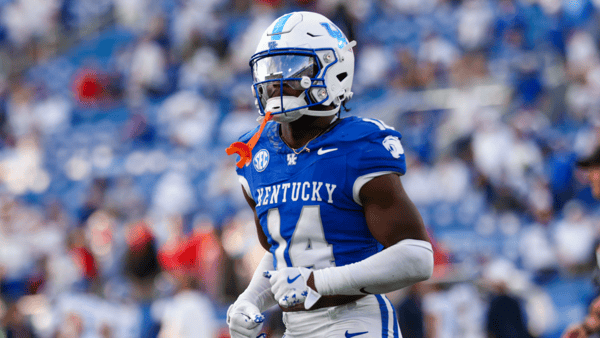
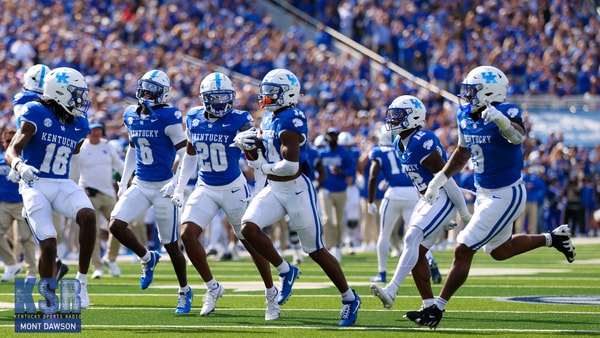
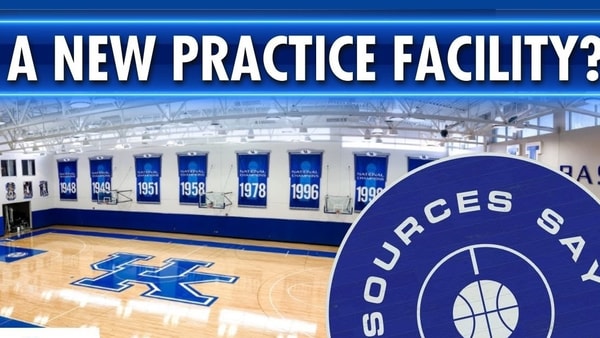
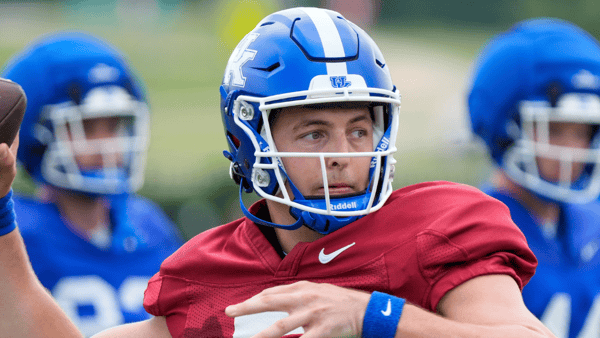
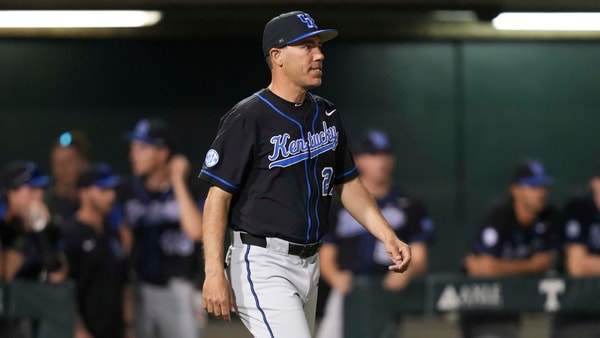
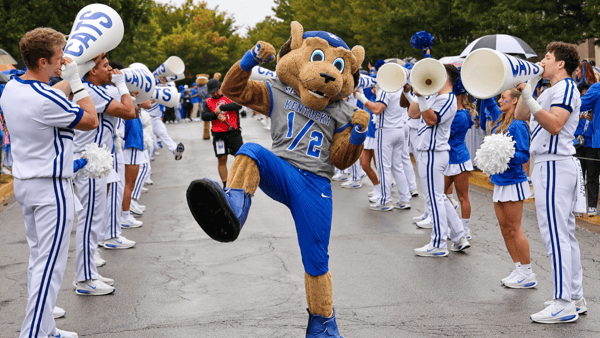
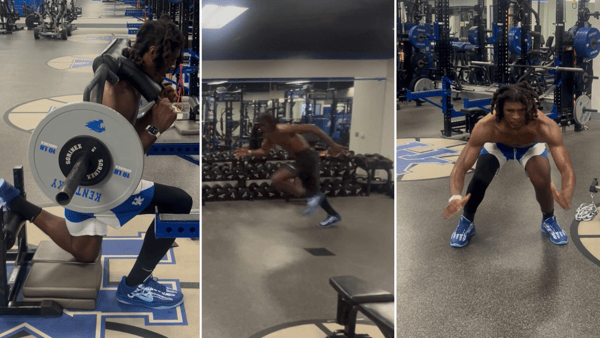
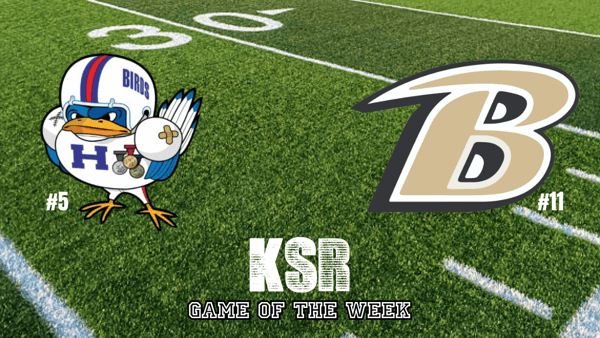
Discuss This Article
Comments have moved.
Join the conversation and talk about this article and all things Kentucky Sports in the new KSR Message Board.
KSBoard